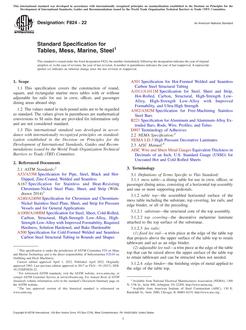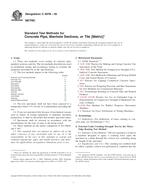1.1 This specification covers chemical and mechanical requirements for nine property classes of carbon and alloy steel externally threaded metric fasteners in nominal thread diameters M1.6 through M100 suited for use in general engineering applications.
1.2 This specification does not cover dimensional requirements for fasteners of any property class. When referencing this specification for procurement purposes, it is mandatory that size, type, style, and any special dimensions of the product be additionally specified.
1.2.1 In case of any conflict in requirements, the requirements of the individual product specification shall take precedence over those of this general specification.
1.2.2 The purchaser may specify additional requirements which do not negate any of the provisions of this general specification or of the individual product specification. Such additional requirements, the acceptance of which are subject to negotiation with the supplier, must be included in the order information (see Section ).
1.3 Requirements for seven of the nine property classes, 4.6, 4.8, 5.8, 8.8, 9.8, 10.9, and 12.9, are essentially identical with requirements given for these classes in ISO 898-1. The other two, 8.8.3 and 10.9.3, are not recognized in ISO standards.
1.4 Classes 8.8.3 and 10.9.3 bolts, screws, and studs have atmospheric corrosion resistance and weathering characteristics comparable to those of the steels covered in Specification A 588. The atmospheric corrosion resistance of these steels is substantially better than that of carbon steel with or without copper addition. See . When properly exposed to the atmosphere, these steels can be used bare (uncoated) for many applications.
1.5 When agreed on by the purchaser, Class 5.8 fasteners may be supplied when either Classes 4.6 or 4.8 are ordered; Class 4.8 may be supplied when Class 4.6 is ordered; Class 8.8.3 may be supplied when Class 8.8 is ordered; and Class 10.9.3 may be supplied when Class 10.9 is ordered.
1.6 The product size range for which each property class is applicable is given in Table 1 and Table 2 on chemical composition requirements, and the mechanical requirements table (see Table 3).
1.7 Appendix X1 gives conversion guidance to assist designers and purchasers in the selection of a suitable property class.
1.8 Appendix X2 explains the significance of the property class designation numerals.
Product Details
- Published:
- 10/10/2002
- Number of Pages:
- 9
- File Size:
- 1 file , 110 KB


